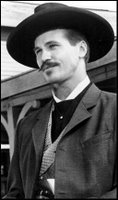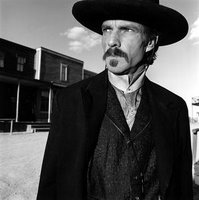Doc and Dustin
The other day, at a random impulse, I picked up the 1992 World Book Encyclopedia and flipped open to the "H's". I found a nice article, complete with picture, of Dustin Hoffman. Completely absent, however, was any entry on Doc Holliday. This, to me, says a lot about our society.
As big a fan as I am of popular culture, I confess to being a little disturbed when we hail actors as being worthy of greater mention than some of the most iconic figures of American history. There is simply no way that Dustin Hoffman, as fine an actor as he is, is anywhere near as cool as Doc Holliday. If you know a person by the praise given him or her by his or her peers, then consider this. Dustin's fellow actors hail him as the one of the finest performers of his generation, a "Jewish Deniro." Doc's fellow gun man, Wyatt Earp, called him "the most skillful gambler, and the nerviest, fastest, deadliest man with a six-gun I ever saw." Case Closed. After all, how can you beat a southern gentleman DENTIST who suddenly decides he'd rather spend his days in knife fights and gun battles? (Although on second thought, I can imagine some dentists to whom that might appeal.)
Here's further evidence for your consideration: Dustin married respectable ladies named Anne and Lisa; Doc traveled with a loose woman known as "Big Nose" Kate. In I Heart Huckabees, Dustin played a man named Bernard. Doc Holliday killed people for having names like that.
In one of my earlier posts on The Da Vinci Code, I lamented the problem of people learning their history from fictional novels and films. Of course, fiction can be an accurate portrayer of historical events; however, the problem lies with people simply accepting what they are presented with at face value because they have no historical knowledge from which to assess it. They take it all in and it becomes a part of their historical framework without them knowing what is true and what is not. This results in people thinking that Mary Magdalene was actually at the Last Supper or that one of the highlights of WWII was when our boys saved Private Ryan.
Nevertheless, fiction can be a catalyst for historical investigation. In the 1990's, Hollywood produced two movies featuring Doc Holliday as a character, neither of which starred Dustin Hoffman. In the first, Tombstone, Doc was played to perfection by Val Kilmer in one of the shining moments of his career. In the second, Wyatt Earp, which came out shortly after, Dennis Quaid strapped on Doc's six-shooter. Although I love Kilmer's portrayal more, Dennis did a better job, I think, of capturing the physical look of Holliday, although it's close call (That's Doc first followed by Kilmer on the left and Quaid on the right).



After seeing these two fictionalized accounts of very real historical events, I was intrigued by the story and so checked out of the library a variety of books on Doc Holliday and Wyatt Earp to learn what was fact and what was fiction in these films. Watching the two movies in close succession and comparing their differing portrayals of the same event can be very illuminating. For instance, they take very different approaches to the shootout at the OK Corral. In a sense, both capture different aspects of the event as eyewitnesses from the time gave several competing descriptions of what really happened. Although Tombstone is definitely the more Hollywoodized version, while Wyatt Earp presents the story in a seemingly more historical fashion, there were interesting moments where Tombstone was more historically accurate than the other.
Most intriguing is their portrayals of Doc Holliday. In Tombstone, Doc is played by Kilmer as a fun-loving, if fatalistic, killer, while Quaid's version is more morose. The wit remains, but it is more biting and dark. The tuberculosis, which gave Holliday his fatalistic outlook, is certainly present in Tombstone, although often under the surface, while in Quaid's portrayal it is never far from one's mind. He lost much weight for the role so that he looks like a dead man walking.
The two movies have very different sensibilities to them. They both present many of the same historical events, but Tombstone aims for a standard Hollywood blockbuster. The goal is to capture the attention of the audience and bring them along on a thrilling ride. It succeeds admirably. Wyatt Earp, by contrast, is a three-hour epic that attempts to address the topic of mythmaking. There is a scene at the end of the film where Wyatt Earp as an old man is approached by a kid who asks him about one of the famous events of his career. It is clear from the way he asks that the real event has already become colored over with the tint of legend. In short Wyatt Earp wants to show us how the man became the myth.
And that is what movies are all about. They perpetuate myth -- an important enterprise that is not to be sneezed at, but it also makes the viewer's task of distinguishing truth from legend more of a challenge. But what a fun challenge it can be.

9 Comments:
Dr. Stevenson, this is by far the best (in my not-so-humble opinion) articles that you have written. It makes me want to watch both of these movies again - for the first time - back to back. You should take on teaching the Film Appreciation class at RC (If you don't already do that too).
I only have one question though. So did Doc Holliday ever say "I'm your huckleberry" or not? ;-)
Now I understand why you didn't write this sooner. Man, that's deep. I was driving school bus yesterday (as usual) when I over heard two kids talking about the DaVinci Code. One said that people are saying it is fictional, but I believe it.
The myth is often preferred. We have our own myths, as Christians. We have the death stories of the Apostles which we do not generally treat as fact (I think) but believe in a loose sort of way.
The myth may even at times make the story more appealling so that we will actually be interested in it.
After having studied a little of American Indian culture, I realized how important stories are to human beings. They are how we form identity, how we grasp concepts, and how we come to understand and interpret meaningful events. I understand that myth can be historically true and it can also be fabrication, but that isn't the point of such stories. Are the tales of Tolkien and C.S. Lewis any less true to human experience and the nature of reality for never actually occurring? I think not. So, even though the American Indian oral histories may contain staggering amounts of historical inaccuracy, they are nonetheless inseparable from the people's identity, values, and worldview. (That is one reason I don't have problems with people saying not every parable or recorded event in the Bible is exactly accurate down to the last detail. They are still true; they still hold every bit of meaning and foundation for identity they always have.) So, you can see why the historical accuracy of books, such the DaVinci Code, becomes irrelevant if people attach themselves to the mythology and invest their identities in those stories. Sure, it’s dangerous for people to have that kind of choice available, but God took the risk… He saw fit to make us so that we have the ability to identify with whichever stories we choose. Ultimately, we can decide to believe and become part of His story or we can choose the other way. That’s why I consider storytelling to be not just an art, but also a significant responsibility.
I was sidetracked from finishing your book Televised Morality, but I recall you made similar points to the effect that a story’s values and perspectives are more important than much of its actual content, including the timeline and events. I believe one such example listed a movie that did not contain swear words or other rating-related "offensive" material, but it presented a twisted worldview where characters flippantly cast aside commitments and covenants and treated each other without respect.
On a side-note, I really enjoyed Kilmer's portrayal of Holiday. I'll have to see Wyatt Earp sometime.
-Dan Curtis
After reading the first few lines I opened a new tab and did a Google search for Doc Holliday. The second item on the list was an entry on wikipedia.org. There is a great article there about your dentist turned gunslinger hero. It seems to me that popular culture really sees the light of day at Google and Wikipedia. Both probably reveal the type of fiber which composes the fabric of contemporary culture much more accurately than a dusty (pun intended) old World Book Encyclopedia.
Otherwise, this is a fabulous post. I enjoyed it immensely. Don’t forget the shoot-out at high noon in front of saloon!
Blessings,
-bw
Greg: There is an interesting discussion involving N.T. Wright and Anne Rice at:
http://www.gracecathedral.org/forum/for_20060514.shtml
I think you would really appreciate this.
blessings,
-bw
bw,
Thanks. I'll check it out.
My favorite line in Tombstone, "I got two guns, one for the both of you," Doc.
A close second, "Are you going to do something, or are you going to stand there and bleed," Wyatt.
It has been five years (at least) since I've watched Tombstone, but there are several images, conversations, and emotions that were revived when I read this post. Movies are as powerful a form of story-telling as we have in our current culture.
Greg, I don't know where you are planning to go next. I'm certainly not trying to preempt any plans. But, I just finished Mitch Albom’s, “The Five People You Meet in Heaven”. The final paragraph follows:
Lines formed at Ruby Pier—just as a line formed someplace else: five people, waiting, in five chosen memories, for a little girl name Amy or Annie to grow and to love and to age and to die, and to finally have her questions answered—why she lived and what she lived for. And in that line now was a whiskered old man, with a linen cap and a crooked nose, who waited in a place called the Stardust Band Shell to share his part of the secret of heaven: that each affects the other and the other affects the next, and the world is full of stories, but the stories are all one.
What finish!
What a beginning!
BW,
Thanks for that. I have not read any of Albom's books, although I do listen to his radio show on and off.
Post a Comment
<< Home